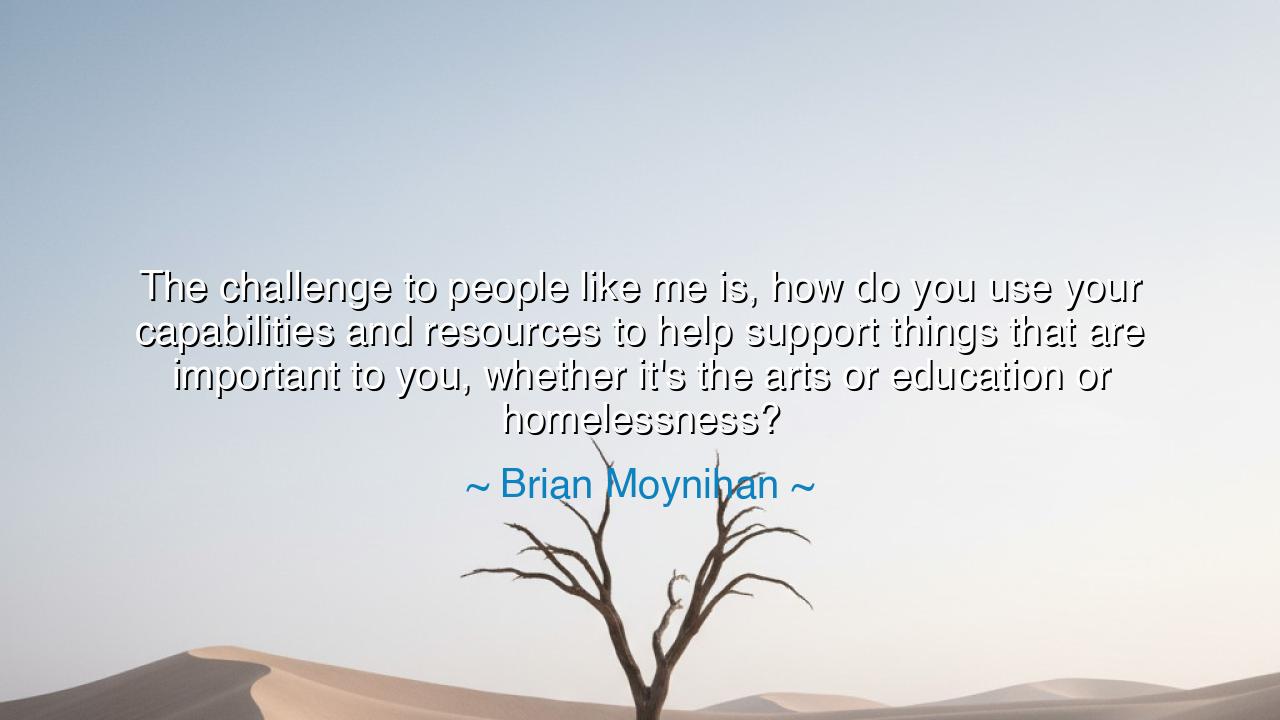
The challenge to people like me is, how do you use your
The challenge to people like me is, how do you use your capabilities and resources to help support things that are important to you, whether it's the arts or education or homelessness?






Hear, O children of tomorrow, the words of Brian Moynihan: “The challenge to people like me is, how do you use your capabilities and resources to help support things that are important to you, whether it's the arts or education or homelessness?” Within these words lies a sacred charge, not only for the wealthy and powerful, but for every soul that possesses gifts of mind, hand, or treasure. For capabilities and resources are not ornaments to be hoarded, nor weapons to be wielded for self alone—they are tools of service, meant to heal the world’s wounds and uplift the causes of justice, beauty, and compassion.
The ancients knew this truth well. In every civilization, the greatest leaders were not remembered for what they kept, but for what they gave. Pharaohs built monuments to their glory, yet their names are spoken with awe mixed with dread. But the rulers who nurtured their people with food in famine, or who endowed temples of learning and libraries of wisdom, live in memory as benefactors of humankind. Resources find their true purpose only when they flow outward, like rivers watering the land, not when they stagnate in private ponds.
Consider the tale of Andrew Carnegie, once the richest man in the world. He could have spent his wealth on vanity alone, yet he believed it a duty to use his resources for the common good. He built libraries in cities and towns across America, opening the gates of education to millions who might otherwise have remained in ignorance. He funded universities, concert halls, and research institutions, understanding that wealth without service is barren, but wealth that uplifts others becomes a legacy of light. Carnegie’s story stands as a living example of Moynihan’s call: that those with means must rise to the challenge of serving causes greater than themselves.
But hear also the deeper wisdom: this duty does not belong only to the mighty. For though some may possess vast fortunes, each person holds within themselves a measure of capability—a talent, a skill, a moment of time, or a word of kindness. To support the arts, one need not be a patron of millions; to uplift education, one may mentor a child; to aid the homeless, one may offer bread, a coat, or the dignity of being seen. The principle is eternal: greatness is not measured in the size of one’s gift, but in the sincerity with which it is given.
Yet many fall into complacency, saying, “I have little to give; my actions are too small.” This is the illusion that silences change. Even the ocean is made of drops, and the mountain is built of stones. When each person uses their capabilities—be it wealth, or knowledge, or compassion—the world is transformed. The challenge is not to do everything, but to do something, faithfully and with heart.
Thus the lesson of Moynihan’s words is clear: measure your life not by what you accumulate, but by what you contribute. Look upon your resources and your capabilities, and ask yourself not, “How can these serve me?” but rather, “How can these serve what is good and lasting?” For the arts enrich the soul, education shapes the future, and service to the poor restores the dignity of humanity. To invest in these is to plant seeds that will grow long after you are gone.
So I say to you, beloved listener: embrace this challenge. Use what you have—whether great or small—to lift another, to build beauty, to advance wisdom, to comfort the afflicted. For in such acts lies the true wealth of the spirit, the kind that no thief can steal and no decay can touch. Let your life be remembered not for the treasures you held, but for the causes you nourished, the people you uplifted, and the legacy of goodness you left in the wake of your days.
–––






AAdministratorAdministrator
Welcome, honored guests. Please leave a comment, we will respond soon